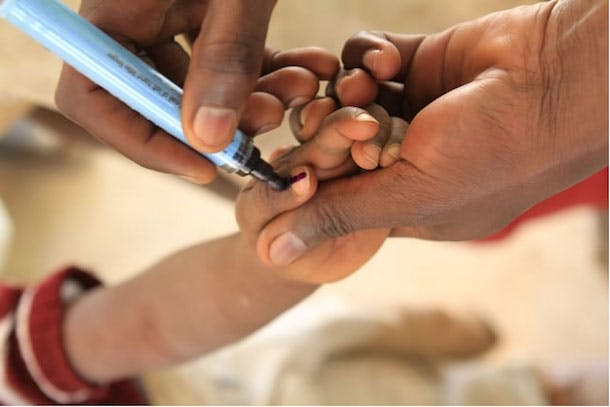
Last week, the Board of Gavi, the Vaccine Alliance approved a measles and rubella strategy that will provide an additional $220 million to measles and rubella activities from 2016-2020. In total, Gavi will invest $820 million over the next five years on measles and rubella activities in Gavi-eligible countries.
The United Nations Foundation is privileged to have worked on measles and rubella since 2001 as a founding partner of the Measles & Rubella Initiative together with the World Health Organization (WHO), the UN Children’s Fund (UNICEF), the U.S. Centers for Disease Control & Prevention, and the American Red Cross. We applaud Gavi’s increased investment in measles and rubella. The measles and rubella work of Gavi and that of the Measles & Rubella Initiative are complementary in the global effort to reduce childhood deaths and to make progress toward eventual measles and rubella elimination. Since 2001, the Measles & Rubella Initiative has worked to ensure no child dies from measles or is born with congenital rubella syndrome.
During that time, we’ve seen incredible gains in the fight against measles and rubella, with 17.1 million deaths averted from 2000-2014. Indeed, measles immunization is one of the leading contributions in reducing childhood deaths in the past 15 years. At the same time, however, progress toward measles and rubella elimination goals has stalled with nearly 115,000 children dying from measles and more than 100,000 babies born with congenital rubella syndrome in 2014.
One of the major factors contributing to the stalled progress is chronic underfunding of measles and rubella immunization activities, resulting in delayed and canceled immunization activities. Gavi’s increased investment will provide predictable funding to support Gavi-eligible countries to expand measles and rubella mass immunization campaigns, strengthen routine immunization systems to introduce a second dose of measles or measles-rubella vaccines, and respond to measles outbreaks.
Gavi’s increased funding will prevent an additional 320,000 future deaths in the next five years. Their investment and strategy is a reflection that investments in measles and rubella vaccinations are one of the best-buys in public health.
It will be through increased funding, focus, and partnership that in the future we can achieve a world where no child dies from measles and no parent has to experience the sorrow of having a child born with congenital rubella syndrome. To learn more about measles and support childhood immunizations against measles, visit the Measles & Rubella Initiative at measlesrubellainitiative.org.
Photo credit: C. McNab



 View All Blog Posts
View All Blog Posts